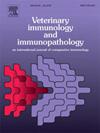慢性体外热与脂多糖应激对牛和牛单核细胞源性巨噬细胞的生理反应有不同的改变
IF 1.4
3区 农林科学
Q4 IMMUNOLOGY
引用次数: 0
摘要
牛牛和印度牛牛在不同的气候条件下进化,获得了各种适应生存的特征。本研究揭示了体外慢性热应激和脂多糖应激对康亚姆牛(Bos indicus)和泽西杂交牛(Bos taurus)单核细胞源性巨噬细胞功能的影响。为了实现这一目标,用脂多糖(1.0 μg/mL)在37°C或40°C下刺激两种牛的单核细胞来源的巨噬细胞24和48 h,并评估它们的细胞和免疫反应。结果表明,在热应激条件下,红鲌单核细胞来源的巨噬细胞表现出增强的细胞活力、氧化和吞噬功能,以及对脂多糖刺激的自噬反应。此外,与牛Bos相比,牛Bos indicus单核细胞来源的巨噬细胞表现出与热休克、细胞信号传导和炎症细胞因子相关的基因转录变异性降低。品种、热应激和脂多糖应激、应激暴露时间及其相互作用等因素对单核细胞源性巨噬细胞的细胞和免疫功能有显著影响。综上所述,印度水牛单核细胞来源的巨噬细胞比牛具有更强的免疫热恢复能力。本文章由计算机程序翻译,如有差异,请以英文原文为准。
Chronic in vitro heat with lipopolysaccharide stress differentially alters physiological response of Bos indicus and Bos taurus monocyte-derived macrophages
The Bos taurus and Bos indicus cattle evolved in different climatic conditions, and they acquired various adaptive traits for their survival. This study unravels the impact of chronic in vitro thermal stress with lipopolysaccharide stress on functional responses of Bos indicus (Kangayam cattle) and Bos taurus (Jersey crossbred cattle) monocyte-derived macrophages. To achieve this, monocyte-derived macrophages from both cattle types were stimulated with lipopolysaccharide (1.0 μg/mL) at either 37°C or 40°C for 24 and 48 h, and their cellular and immune responses were evaluated. The results revealed that Bos indicus monocyte-derived macrophages exhibit enhanced cell viability, oxidative and phagocytosis functions, as well as improved autophagy response to lipopolysaccharide stimulation during thermal stress. Additionally, Bos indicus monocyte-derived macrophages demonstrated reduced variability in transcription of genes related to heat shock, cell signalling, and inflammatory cytokines compared to Bos taurus. Factors such as breed, thermal and lipopolysaccharide stress, period of stress exposure, and their interactions have a significant impact on cellular and immune functions of monocyte-derived macrophages. In conclusion, the monocyte-derived macrophages of Bos indicus possess an enhanced immune-thermal resilience property than Bos taurus.
求助全文
通过发布文献求助,成功后即可免费获取论文全文。
去求助
来源期刊
CiteScore
3.40
自引率
5.60%
发文量
79
审稿时长
70 days
期刊介绍:
The journal reports basic, comparative and clinical immunology as they pertain to the animal species designated here: livestock, poultry, and fish species that are major food animals and companion animals such as cats, dogs, horses and camels, and wildlife species that act as reservoirs for food, companion or human infectious diseases, or as models for human disease.
Rodent models of infectious diseases that are of importance in the animal species indicated above,when the disease requires a level of containment that is not readily available for larger animal experimentation (ABSL3), will be considered. Papers on rabbits, lizards, guinea pigs, badgers, armadillos, elephants, antelope, and buffalo will be reviewed if the research advances our fundamental understanding of immunology, or if they act as a reservoir of infectious disease for the primary animal species designated above, or for humans. Manuscripts employing other species will be reviewed if justified as fitting into the categories above.
The following topics are appropriate: biology of cells and mechanisms of the immune system, immunochemistry, immunodeficiencies, immunodiagnosis, immunogenetics, immunopathology, immunology of infectious disease and tumors, immunoprophylaxis including vaccine development and delivery, immunological aspects of pregnancy including passive immunity, autoimmuity, neuroimmunology, and transplanatation immunology. Manuscripts that describe new genes and development of tools such as monoclonal antibodies are also of interest when part of a larger biological study. Studies employing extracts or constituents (plant extracts, feed additives or microbiome) must be sufficiently defined to be reproduced in other laboratories and also provide evidence for possible mechanisms and not simply show an effect on the immune system.

 求助内容:
求助内容: 应助结果提醒方式:
应助结果提醒方式:


